
COVID-Blog
New platform for a coordinated response against COVID-19 launched in Central African Republic
06 May 2020
06 May 2020 06 May 2020In the Central African Republic, civil society organizations have launched "Solidarity for action"—a platform created by associations of people living with HIV, sex workers and LGBTI organisations, TB and malaria activists, and human rights groups—to ensure mobilization and coordinated actions to reduce the vulnerability of these populations to COVID-19 and ensure continued access to HIV services, tuberculosis and malaria and respect for human rights in an unprecedented global crisis.
The creation of the platform was led by UNAIDS with support from UNICEF, IOM, UN women and WHO. The platform will be funded by the Global Fund through the reprogramming of savings from the current grant.
Solidarity in action. Great 2 join civil society, people living with HIV, TB & Malaria, human rights groups to lunch Platfrom 4 synergy to adress COVID-19, HIV, TB, Malaria. Stressing rights & community solutions https://t.co/ZH1IqFOwYq. @UNAIDS @UNICEF_CAR @IOM_CAR @ONUFemmes pic.twitter.com/OdUEzJdXX1
— Patrick Eba (@EbaPatrick) May 5, 2020

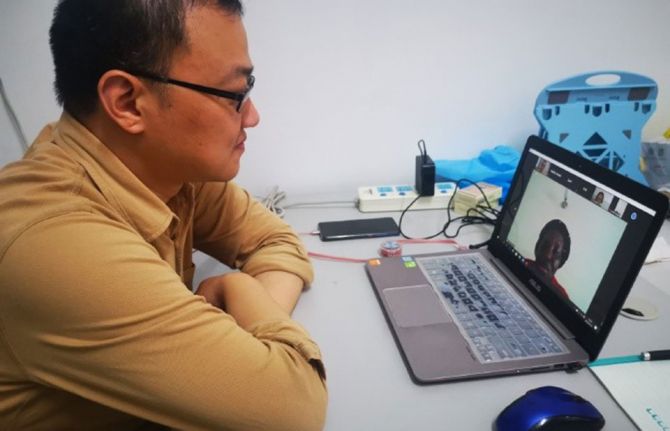
COVID-Blog
UNAIDS and WeDoctor organise an experience sharing session on COVID-19 between China and Kenya
06 May 2020
06 May 2020 06 May 2020The UNAIDS China Office and the UNAIDS Kenya office, in collaboration with WeDoctor—a Chinese medical service platform—held an online session with more than 70 doctors from Kenya to share China’s experience responding to COVID-19.
Two Chinese experts—Dr Zhu Yunxia from Beijing YouAn Hospital, specialized in maternal and childbirth guidance and Dr Zhao Lei from Wuhan Union Hospital, specialized in infectious diseases—shared their hands-on experience responding to the novel coronavirus on the frontline, focusing on the general clinical treatment and perinatal management of COVID-19 infection.
“I trust that the presentations and discussions today will empower our doctors in Kenya with the skills that they require to achieve the success we need in Kenya’s COVID-19 response,” said the Kenyan Ambassador to China, Sarah Serem.
Christine Sadia, the chairperson of Kenya Medical Women's Association, offered her support to UNAIDS and WeDoctor to replicate the initiative beyond Kenya.

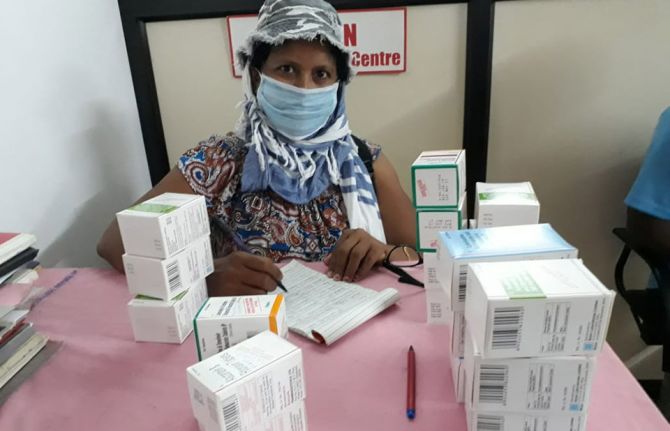
COVID-Blog
Mitigating the impact of the COVID-19 pandemic among people living with HIV in India
06 May 2020
06 May 2020 06 May 2020For the more than 3000 people, including 330 children and adolescents, living with HIV and on antiretroviral therapy in Goa, India, the COVID-19 outbreak is a time of worry—they are worried about COVID-19 and they are worried about being able to stay on their HIV treatment during the lockdown in India.
In order to respond to one of those worries, the team at the Human Touch Foundation, a community-based organization that provides care and support to children and adolescents living with HIV, has, since the start of the lockdown, organized a force of volunteers to deliver antiretroviral therapy to people’s doorsteps.

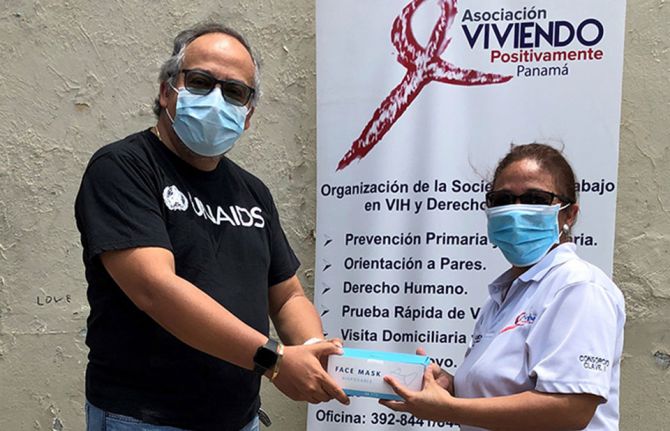
COVID-Blog
UNAIDS donates protective equipment to volunteers in Panama
06 May 2020
06 May 2020 06 May 2020The UNAIDS regional office for Latin America and the Caribbean donated personal protective equipment (PPE) including gloves and surgical masks to the Living Positive Association to protect volunteers who deliver antiretroviral drugs to their peers in different regions of the country during the coronavirus pandemic.
The equipment provided will help ensure that volunteers and focal points of the civil society organization remain healthy and can continue to provide the necessary assistance.
Read the news story (in Spanish)

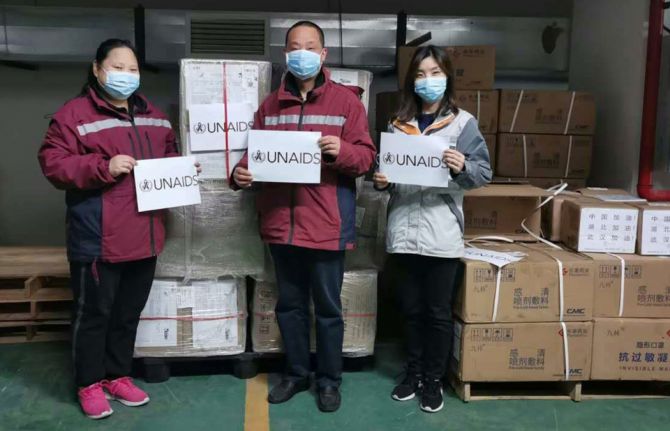
COVID-Blog
UNAIDS donates N-95 masks for frontline health workers in China
05 May 2020
05 May 2020 05 May 2020The UNAIDS China Office has donated 10,000 N-95 masks to the Hubei Provincial Center for Disease Control and Prevention in order to ensure continuity of services for people living with HIV and other key populations affected by COVID-19, including HIV testing and the distribution of antiretroviral and methadone treatment.
“The COVID-19 outbreak is having a major impact on people living with HIV and their service providers in Hubei Province,” said Sande Amakobe, Director of the UNAIDS China Office. “I hope our donation to Hubei CDC can support health personnel to stay safe and healthy so they can continue to provide effective services for people living with HIV.”
Even though the situation of the epidemic is gradually improving, according to Song Yi, an official working at Hubei CDC, “we are still in need of medical equipment and the donation from UNAIDS will fill the gap. We really appreciate the support from UNAIDS.”

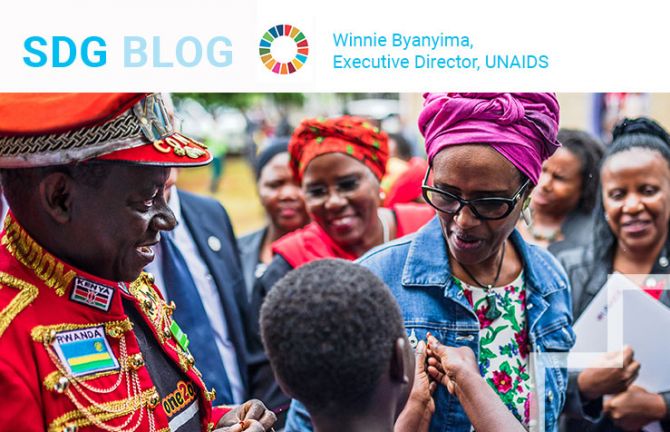
COVID-Blog
We must act together to beat COVID-19 in Africa
05 May 2020
05 May 2020 05 May 2020The COVID-19 outbreak has been placing unprecedented strains on sophisticated health systems in Europe and Asia, with overstretched medical staff struggling to treat their patients and intensive care facilities overwhelmed in rich countries. With cases rising in Africa, concerns are increasing on the impact on fragile health systems there. This crisis is already exposing glaring inequalities between the rich and the poor in the developed world, and it is about to reflect even greater inequalities between the North and the South.
Read the full opinion piece by UNAIDS Executive Director, Winnie Byanyima

COVID-Blog
Behind the Front Lines: human faces of the #COVID19 response
04 May 2020
04 May 2020 04 May 2020A series of portraits of women and men of the United Nations family, each contributing in their own way to the common fight against the coronavirus. Fahmida Khan is a Community Support Advisor at UNAIDS Pakistan.
Behind the Front Lines: human faces of the #COVID19 response.
— UN Geneva (@UNGeneva) May 4, 2020
A series of portraits of women & men of the UN family, each contributing in their own way to the common fight against the coronavirus.
Fahmida Khan is a Community Support Advisor at @UNAIDS Pakistan.#StrongerUNited pic.twitter.com/8mGnzP1Pcd

COVID-Blog
Paying tribute to care workers during an online Labour Day event
01 May 2020
01 May 2020 01 May 2020On 1 May 2020, the UNAIDS Executive Director Winnie Byanyima joined Oxfam Denmark to pay tribute to care workers during an online Labour Day event. Below are the transcripts of her video message.
"It’s an honour to join you to celebrate 1 May—the international day of workers. In the time of COVID-19, it is our frontline workers in hospitals, community health centres, care facilities, supermarkets, taxis and delivery vans who are risking their lives for us," said Ms Byanyima.

COVID-Blog
Safer sex in the time of COVID-19
01 May 2020
01 May 2020 01 May 2020The UNAIDS regional office for the Latin America and the Caribbean region has designed a set of graphics and audiovisual material with information about sex in the time of COVID-19.
Intended to be disseminated on social media channels in Latin America and the Caribbean, they provide information on issues related to sex, sexual relations and COVID-19.
The information is presented in a question and answer format, using a very simple language, practical advice, and scientific facts on best practices to decrease the risk of transmission of HIV, other sexually transmitted infections, and COVID-19 in this time of pandemic.
¿Se puede transmitir el coronavirus a través de las relaciones sexuales?
— ONUSIDA Latina (@OnusidaLatina) April 29, 2020
Todavía tenemos mucho que aprender sobre #COVID19 y el sexo.
Aquí https://t.co/rYLGSGqbZX te compartimos algunas respuestas para ayudarte a prevenir la transmisión del VIH, las ITS y el #Coronavirus. pic.twitter.com/zSekDb5IqC

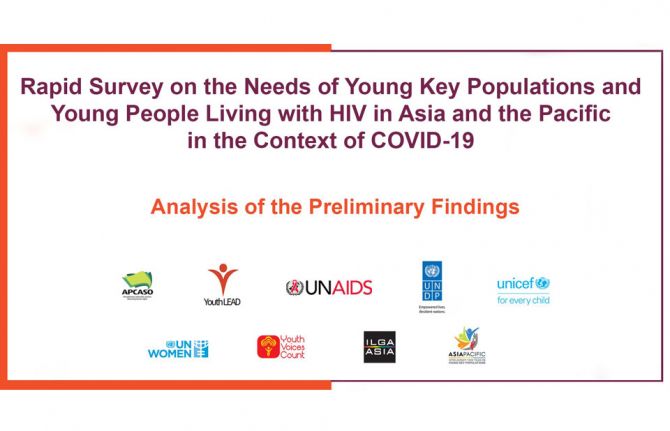
COVID-Blog
The coronavirus pandemic is negatively affecting the socio-economic status of young key populations and young people living with HIV in Asia-Pacific
01 May 2020
01 May 2020 01 May 2020The preliminary results of the survey launched by the Interagency Task Team (IATT) on young key populations (YKPs) in Asia and the Pacific to assess the needs and ability of young key populations in accessing information, medication and other HIV services during COVID-19 show that the pandemic is having a significant negative socio-economic impact on young key populations and young people living with HIV.
46% of the respondents expressed that the restrictive measures put in place to curb the spread of the pandemic are affecting their ability to access food supplies and basic commodities they need to survive. Another 46% reported that these measures led to a loss of income and employment.
In terms of HIV treatment, 51% said they are currently on antiretroviral (ARV) treatment. Of those, 30% have a 2-3 month refill of ARV medicines, 29% have only one month dose and 22% have treatment for 3 weeks or less. 17% of the respondents said they do not have ARV refills on hand and 43% of young people on ARV treatment don’t know if their country allows multi-month prescriptions for essential medicines. Finally, more than 64% are concerned about the exposure to COVID-19, while 50% have identified distance to ARV clinics and lockdowns as the main challenges in getting ARVs.
Based on the results of the survey, the IATT on YKP made a set of recommendations to improve access to information, access to HIV and other health services and access to social protection for young key populations and young people living with HIV. These include providing timely and appropriate information on HIV and COVID-19; finding innovative solutions to ensure access to multi-month dispensing of ARVs and other commodities such condoms; and ensure the provision of food and other social protection services and exploring the possibility to provide cash transfer to YKPs who have lost employment or in vulnerable condition.
These recommendations are aimed at informing countries as they develop their contingency plans to ensure continued access to HIV and other services for vulnerable and key populations while responding to the COVID-19 pandemic.
Check out the results of the survey and the recommendations here
